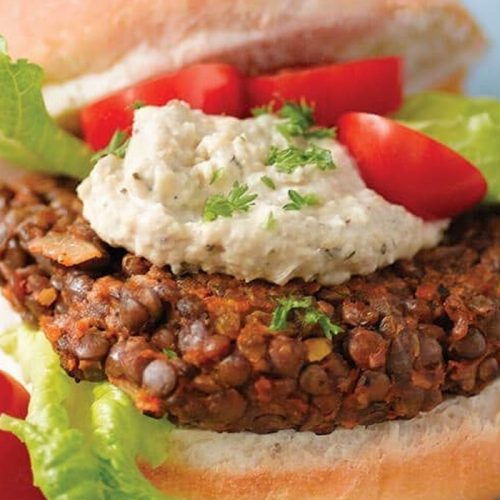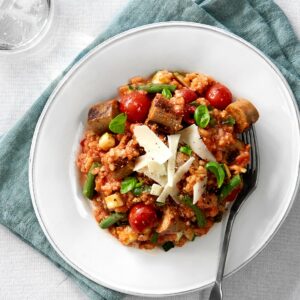
Tired all the time? Getting a better night’s sleep might be as simple as putting a few foods on – and off – the menu. Here are five foods that help you sleep better, plus those to limit for a better night’s rest.
Many of us aren’t getting enough sleep, and only one in seven of us sleeps through the night without waking. While there’s a long list of potential sleep-stealing habits – from using screens too close to bedtime to sleeping in too long on the weekends – studies have found a clear link between diet and the quality and quantity of sleep. Read on to discover the foods to eat – and avoid – if you want a better night’s sleep.
What to eat for better sleep
Sticking to a Mediterranean-style diet rich in vegetables, fruits, whole grains, legumes, nuts, seeds and healthy fats is a good start to sleeping well. A 2019 study revealed people who have this type of diet consistently sleep better as a result. But the following specific foods and drinks may also help.
1 Butter beans
Also known as lima beans, research has revealed people who eat butter beans as a staple part of their diet are six times more likely to enjoy good-quality sleep. Why? Butter beans are rich in phosphorous, a mineral that can increase time spent asleep and reduce waking episodes during the night. Plus, they’re a good source of fibre, which has also been linked to promoting sound sleep.
2 Tempeh
Made from soy beans that have been fermented and compacted, tempeh is a good source of isoflavones. These plant-derived compounds act a bit like oestrogen, a hormone that, among other things, modulates sleep duration and quality. According to a Japanese study, this explains why people with larger daily isoflavone intakes enjoy better-quality sleep. Researchers suggest aiming for around 50mg of isoflavones a day, which you’ll find in 100 to 150g of tempeh. Other soy foods, such as tofu, miso and edamame, also contain isoflavones.
3 Tart cherry juice
Research suggests drinking a glass of tart cherry juice every day can help you get more sleep at night, after just seven days. This effect is thought to be due to tart cherries containing melatonin, a phytochemical that plays a key role in regulating the sleep-wake cycle.
4 Almonds
Eat 10 almonds every day and your sleep quality could improve after just two weeks, a study indicated. Almonds contain plenty of magnesium, a nutrient that one in three of us are deficient in. As well as stabilising the body’s sleep-wake cycle by regulating melatonin, magnesium acts as a natural muscle relaxant, too.
5 Brown rice
In addition to being another good source of magnesium, like all whole grains, brown rice also delivers a hit of tryptophan, an amino acid that the body converts into serotonin, the good-mood brain chemical that also promotes good sleep. Plus, because it’s a complex carbohydrate, when you eat a serve of brown rice your stress hormone levels fall and your body is prompted to produce gamma-aminobutyric acid, or GABA, an inhibitory neurotransmitter that can help to improve sleep.
What foods to limit for better sleep
Some specific foods to limit for a better night’s sleep include:
Refined carbohydrates
Think white rice, bread and pasta, as well as foods such as highly processed breakfast cereals. A recent study made the connection between diets rich in refined carbs and a higher risk of insomnia. One theory behind this is foods that cause blood sugar levels to rise and fall rapidly will trigger the release of sleep-interfering hormones.
Foods high in added sugar
The link between consuming sugar-sweetened foods and drinks and poorer sleep is clear, with research proving sugar-rich diets increase the likelihood of having broken sleep each night. One in two Westerners consume more than the healthy amount of added sugar. To cut back, choose foods with no more than 15g of sugar (but ideally less than 5g of sugar) per 100g, aiming to eat no more than 25g of sugar a day.
Foods high in saturated fat
While a University of Adelaide study found that people with high-fat diets are more likely to report experiencing sleep problems, other research shows that as saturated fat intake creeps up, slow-wave sleep (the type of deep sleep that’s essential for good health) decreases. To avoid this, aim to eat foods with less than 3g of saturated fat per 100g
5 food and sleep claims tested
Claim 1 Warm milk helps you sleep
True! A review study published in 2020 found that consuming milk, along with other dairy products, improves sleep quality. Researchers suggest it’s because milk contains the amino acid tryptophan, which the body turns into sleep-inducing chemicals.
Claim 2 Cheese gives you nightmares
False – probably. While one study does suggest an anecdotal link between eating cheese (as well as chocolate, chilli and pickles) and having disturbing dreams, other research not only discounts the theory, it puts cheese in the same dairy-is-good-for-sleep category as milk.
Claim 3 After-dinner coffee makes it harder to fall asleep
True, but it’s not just after dinner that matters. Having caffeine within a six-hour window before bedtime can affect your sleep.
Claim 4 Eating too late at night keeps you awake
True. While going to bed hungry isn’t conducive to a good night’s sleep, research shows that late-night meals bump up your risk of having a fitful night’s sleep.
A good rule of thumb is to make the two hours before bed a food-free zone.
Claim 5 Alcohol makes you sleepy
True – but there’s a catch. The sedative effects of alcohol upset the healthy balance between two of the four sleep stages that you rotate between each night, decreasing the overall quality of your sleep. This means you’ll wake up feeling tired rather than well rested.
Article sources and references
- Godos J et al. 2019. Adherence to the Mediterranean diet is associated with better sleep quality in Italian adults. Nutr. 11(5): 976.https://www.ncbi.nlm.nih.gov/pmc/articles/PMC6566275/
- ScienceDaily. 2017. Blue light emitted by screens damages our sleep, study suggests. Accessed February 2021https://www.sciencedaily.com/releases/2017/08/170822103434.htm#:~:text=Blue%20light%20emitted%20by%20screens%20damages%20our%20sleep%2C%20study%20suggests,-Date%3A%20August%2022&text=Summary%3A&text=This%20is%20the%20conclusion%20of,was%20similar%20to%20normal%20sleep.
- Mayo Clinic. 2019. Mediterranean diet: a heart-healthy eating plan. Accessed February 2021.https://www.mayoclinic.org/healthy-lifestyle/nutrition-and-healthy-eating/in-depth/mediterranean-diet/art-20047801
- Medical Daily. 2019. How diet may lead to insomnia. Accessed February 2021https://www.medicalnewstoday.com/articles/327302
- Oregon State University. 2016. Soy isoflavones. Accessed February 2021https://lpi.oregonstate.edu/mic/dietary-factors/phytochemicals/soy-isoflavones
- University of Adelaide. 2016. Fatty diets lead to daytime sleepiness, poor sleep. Accessed February 2021https://www.adelaide.edu.au/news/news84342.html#:~:text=University%20of%20Adelaide%20researchers%20have,to%20suffer%20from%20sleep%20apnoea.
- YouGov. 2019. One in three Australians not getting enough sleep. Accessed February 2021https://au.yougov.com/news/2019/03/21/one-three-australians-not-getting-enough-sleep/
www.healthyfood.com










